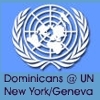

| BRIEFING - January 25, 2012 | To learn more about the Millenium Development Goals, click on the graphic Past Briefings: January 11, 2012 December 21, 2011 December 7, 2011 November 9, 2011 October 19, 2011 October 5, 2011 September 21, 2011 September 7, 2011 August 24, 2011 August 10, 2011 June 22, 2011 June 8, 2011 May 11, 2011 April 27, 2011 April 6, 2011 |
|
Social Protection Floor would meet basic human needs The 50th Session of the Commission for Social Development will take place Feb. 1–10 here in New York. The priority theme is poverty eradication. This year’s session will be a policy session, and will result in a set of resolutions or decisions regarding the priority theme. In addition to the priority theme, the session will review relevant UN plans and programs of action pertaining to the situation of certain social groups, such as disabled persons, youth, ageing and the family. In conjunction with the commission, there will be a Civil Society Forum on Jan. 31. This provides an opportunity for civil society/NGOs to share with members of the commission the elements they feel are crucial to any serious conversation on the way forward in the area of poverty eradication. Over the past year, the NGO community has been advocating for what is called a “social protection floor,” and this will be our focus during the Civil Society Forum. The UN has designated the social protection floor as one of its nine crisis response initiatives. Led by the International Labor Organization (ILO) and the World Health Organization (WHO), it is supported by cooperating agencies within the UN system, including the Food & Agriculture Organization (FAO), the Office of the High Commissioner of Human Rights (OHCHR), the United Nations Children’s’ Fund (UNICEF), the International Monetary Fund (IMF) and the World Bank. In a report entitled “Social Protection Floor for a Fair and Inclusive Globalization,” prepared by a high-level panel chaired by Michele Bachelet, the former president of Chile, it is well noted that “While globalization has been a source of opportunities for those who have been able to seize them, it has left many unprotected against new global challenges and transformations… The persistence of large numbers of excluded persons represents tremendous squandered human and economic potential… Social protection is a missing piece in a fairer and inclusive globalization.” The report cites data from the World Bank, ILO, FAO, WHO and UNICEF, which offers us some grim statistics:
The concept of a social protection floor is rooted in the fundamental principle of social justice, and in the specific universal right of everyone to social security and to a standard of living adequate for the health and well-being of themselves and their families. The very basic idea is that no one should live below a certain income level, and everyone should at least have access to basic social services. The components of a social protection floor include:
Of course, the question is always, “Where will the money come from?” In the above mentioned report, it is well noted that “Several studies, notably by the ILO, UNICEF, WHO… attest to the affordability (of a social protection floor). To what extent resources should be devoted to such measures remains a country-specific choice. In other words, levels of social provision are driven more by a country’s political and policy environment than its level of economic development. The cost of a well-designed social protection floor is small compared to the tax revenues often foregone by not effectively collecting from the wealthy and by not tackling inefficiencies that exist in many expenditure programs.” The reality on the international level is not unlike the struggle we have right here within the United States regarding our deficit. Do we reduce the deficit by cutting programs that assist the most vulnerable among us, and let the top 1 percent rest in their millions? Or… do we cut programs where appropriate, and tax the top 1 percent as well? In my last Briefing, I referenced the recent Vatican document calling for the reform of the global financial/economic system. A section of it is worth repeating in light of this topic of social protection: “Every individual and every community shares in promoting and preserving the common good. To be faithful to their ethical and religious vocation, communities of believers should take the lead in asking whether the human family has adequate means at its disposal to achieve the global common good.” I would like to offer you a very simple way to join your voice to ours in our advocacy efforts around social protection. I encourage you to sign the online petition for the Social Protection Floor Campaign, and pass it on to your friends and associates. This is one way to remind the powers-that-be that the vast majority of our brothers and sisters throughout the world do not have at their disposal adequate means to achieve the global common good. For more information on the Social Protection Floor, click here.
|
Dominican Leadership Conference
Building relationships and collaborating in the mission of preaching the Gospel
29000 West Eleven Mile Road
Farmington Hills MI 48336
248-536-3234 Contact: Executive Director
